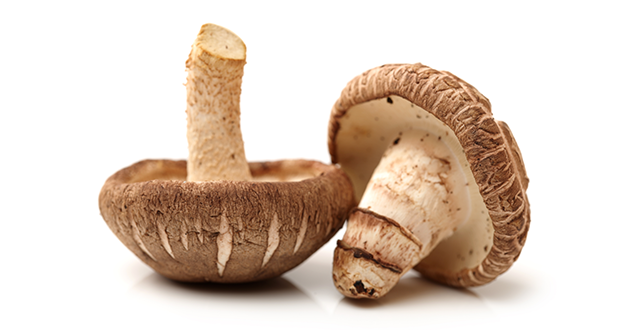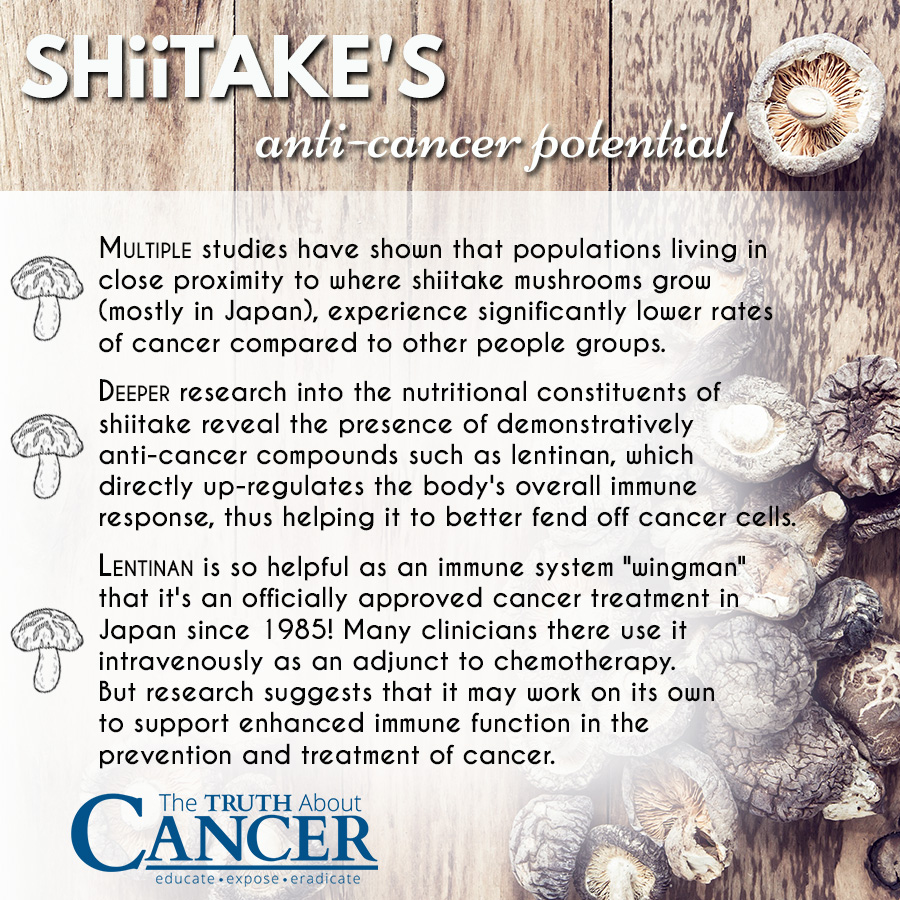Shiitake Mushroom: Gourmet Ingredient or Medicinal Powerhouse?

You can find it in
everything from Asian stir fry and Vietnamese pho to Italian-inspired
Fettuccine Alfredo and even atop your favorite All-American,
flame-broiled burger. That’s because shiitake mushroom, known
scientifically as Lentinula edodes, is one of the world’s most
popular gourmet mushrooms. And for good reason… it’s insanely tasty and
pairs well with almost any kind of food.
But did you know that the shiitake mushroom is also highly medicinal? This characteristically brown, stubby fungi is one of the world’s most therapeutic functional foods. It holds a top spot in the scientific literature for its capacity to increase the human life force − what Traditional Chinese Medicine refers to as “chi,” or the Christian concept of the “breath of life” given by God to mankind.
Shiitake is also highly regarded as a longevity mushroom capable of both improving quality of life and lengthening lifespan.
Multiple studies have shown that populations living in close proximity to where shiitake mushrooms grow (mostly in Japan), experience significantly lower rates of cancer compared to other people groups.
This correlation is quickly proving to be causative. More advanced research into the nutritional constituents of shiitake reveal the presence of demonstratively anti-cancer compounds such as lentinan, which directly up-regulates the body’s overall immune response, thus helping it to better fend off cancer cells.
In terms of how it interacts with cancer cells, lentinan doesn’t actually kill them. Instead, it helps spur the immune system to kill cancer cells which, believe it or not, is the immune system’s job. This fact often gets lost in the mainstream narrative about cancer, but it’s true. If your immune system is healthy and functioning optimally, it’s fully capable of keeping cancer cells in check so they don’t develop into tumors and metastasize.
Lentinan is so helpful as an immune system “wingman” that it’s an officially approved cancer treatment in Japan, and has been since 1985! Many clinicians there use it intravenously as an adjunct to chemotherapy. But research suggests that it may work on its own to support enhanced immune function in the prevention and treatment of cancer.
A beta-1,3 glucan, lentinan is a bioactive polysaccharide that’s uniquely present in shiitake mushrooms, though it hails from the larger beta-glucan family of mushroom compounds that’s been extensively studied for its extensive immunotherapeutic properties.
What makes lentinan uniquely special is its ability to perform an array of anticancer functions. Everything from increasing nutrient absorption to boosting white blood cell counts and minimizing pro-inflammatory cytokines.
Lentinan has shown efficacy in the treatment of leukemia, sarcoma, myeloma, as well as cancers of the stomach, bladder, and colon. One study published in the journal Cancer Detection and Prevention back in 1987 describes lentinan as “a unique class of immunopotentiator,” further delineating its ability to trigger “the increased production of various kinds of bioactive serum factors associated with immunity and inflammation.” The incredible thing is that is does all this while generating few, if any, toxic side effects.
Part of the reason why lentinan is often used in conjunction with chemotherapy and/or radiotherapy treatments is that it helps heal the chromosome damage caused by the systemic poisoning of the body with cytotoxic chemical drugs and radiation. Studies on cancer cell lines, including one on gastric adenocarcinoma cells, have also shown that lentinan is potently apoptotic, meaning it induces programmed cancer cell death.

Each strand of DNA in your body is equipped with built-in protective caps known as telomeres that exist on each end of the chromosomal structure. Some scientists have likened these telomeres to the plastic tips on the end of shoelaces that keep them from unraveling. This is because they operate in much the same manner − guarding DNA strands from factors that might contribute to their eventual unraveling.
As we age, our telomeres gradually shorten due to decreasing quantities of telomerase, the enzyme responsible for adding nucleotides to telomeres. In other words, telomerase acts as a type of building block for maintaining the integrity of protective telomeres. But cancer cells also have telomeres that grow and respond to telomerase, and this is the type that lentinan works to stop in its tracks.
Telomerase activity in healthy cells is typically not detectible, at least in the sense of expanding the length of telomeres like it does in upwards of 90% of cancer cells. This proliferative effect is why cancer cells spread and metastasize, a highly destructive process that can be avoided through the application of lentinan.
Acting to suppress the mRNA expression of human telomerase reverse transcriptase (hTERT), lentinan was shown in the aforementioned study to inhibit the activity of telomerase in feeding the DNA strands of cancer cells. It thus stops cancer cells from doing what they do best: supplanting healthy cells and taking over their host.
The other way to receive the benefits of lentinan from shiitake is through a high quality supplement which allows for a steady, constant supply which is not dependent on finding and preparing shiitake mushrooms to eat.
Generally speaking, as demonstrated in the larger body of scientific literature, shiitake mushrooms and lentinan are safe and effective functional foods (and supplements) that have a rightful place in the arsenal of natural, anti-cancer medicines.
Curious what “mushroom blend” I take everyday is?
Go here to find out now
But did you know that the shiitake mushroom is also highly medicinal? This characteristically brown, stubby fungi is one of the world’s most therapeutic functional foods. It holds a top spot in the scientific literature for its capacity to increase the human life force − what Traditional Chinese Medicine refers to as “chi,” or the Christian concept of the “breath of life” given by God to mankind.
Shiitake is also highly regarded as a longevity mushroom capable of both improving quality of life and lengthening lifespan.
The Amazing Cancer-Fighting Properties of Shiitake
There are myriad uses for shiitake mushrooms, both in anti-aging medicine and nutritional therapeutics. But the area I want to focus on for the purpose of this article is shiitake’s anti-cancer potential. For many years, shiitake has been a primary focus of research at the Mushroom Research Institute in Tokyo. This is because of ever-mounting evidence demonstrating its powerful ability to fight cancer cells, which is good news in a world increasingly riddled with cancer.Multiple studies have shown that populations living in close proximity to where shiitake mushrooms grow (mostly in Japan), experience significantly lower rates of cancer compared to other people groups.
This correlation is quickly proving to be causative. More advanced research into the nutritional constituents of shiitake reveal the presence of demonstratively anti-cancer compounds such as lentinan, which directly up-regulates the body’s overall immune response, thus helping it to better fend off cancer cells.
Shiitake’s Weapon of Choice Against Cancer
Like most edible mushrooms, shiitake is loaded with complex carbohydrate compounds known as polysaccharides that fuel the body’s uptake and storage of energy. Mushroom polysaccharides also help kickstart the immune system, revving it into “overdrive,” so to speak, as a means by which to maximize resistance to infection and disease.In terms of how it interacts with cancer cells, lentinan doesn’t actually kill them. Instead, it helps spur the immune system to kill cancer cells which, believe it or not, is the immune system’s job. This fact often gets lost in the mainstream narrative about cancer, but it’s true. If your immune system is healthy and functioning optimally, it’s fully capable of keeping cancer cells in check so they don’t develop into tumors and metastasize.
Lentinan is so helpful as an immune system “wingman” that it’s an officially approved cancer treatment in Japan, and has been since 1985! Many clinicians there use it intravenously as an adjunct to chemotherapy. But research suggests that it may work on its own to support enhanced immune function in the prevention and treatment of cancer.
A beta-1,3 glucan, lentinan is a bioactive polysaccharide that’s uniquely present in shiitake mushrooms, though it hails from the larger beta-glucan family of mushroom compounds that’s been extensively studied for its extensive immunotherapeutic properties.
What makes lentinan uniquely special is its ability to perform an array of anticancer functions. Everything from increasing nutrient absorption to boosting white blood cell counts and minimizing pro-inflammatory cytokines.
Lentinan has shown efficacy in the treatment of leukemia, sarcoma, myeloma, as well as cancers of the stomach, bladder, and colon. One study published in the journal Cancer Detection and Prevention back in 1987 describes lentinan as “a unique class of immunopotentiator,” further delineating its ability to trigger “the increased production of various kinds of bioactive serum factors associated with immunity and inflammation.” The incredible thing is that is does all this while generating few, if any, toxic side effects.
Part of the reason why lentinan is often used in conjunction with chemotherapy and/or radiotherapy treatments is that it helps heal the chromosome damage caused by the systemic poisoning of the body with cytotoxic chemical drugs and radiation. Studies on cancer cell lines, including one on gastric adenocarcinoma cells, have also shown that lentinan is potently apoptotic, meaning it induces programmed cancer cell death.

Lentinan Can Help Increase Lifespan by Fine-Tuning Gene Expression
There’s another way that lentinan works to target cancer, and it involves its ability to alter certain gene processes responsible for mitigating the growth and spread of cancer cells. Research published in the peer-reviewed Avicenna Journal of Medical Biotechnology investigates this emerging target of cancer research, known as telomerase, and how lentinan interacts with it to help keep cancer at bay.Each strand of DNA in your body is equipped with built-in protective caps known as telomeres that exist on each end of the chromosomal structure. Some scientists have likened these telomeres to the plastic tips on the end of shoelaces that keep them from unraveling. This is because they operate in much the same manner − guarding DNA strands from factors that might contribute to their eventual unraveling.
As we age, our telomeres gradually shorten due to decreasing quantities of telomerase, the enzyme responsible for adding nucleotides to telomeres. In other words, telomerase acts as a type of building block for maintaining the integrity of protective telomeres. But cancer cells also have telomeres that grow and respond to telomerase, and this is the type that lentinan works to stop in its tracks.
Telomerase activity in healthy cells is typically not detectible, at least in the sense of expanding the length of telomeres like it does in upwards of 90% of cancer cells. This proliferative effect is why cancer cells spread and metastasize, a highly destructive process that can be avoided through the application of lentinan.
Acting to suppress the mRNA expression of human telomerase reverse transcriptase (hTERT), lentinan was shown in the aforementioned study to inhibit the activity of telomerase in feeding the DNA strands of cancer cells. It thus stops cancer cells from doing what they do best: supplanting healthy cells and taking over their host.
Shiitake Mushrooms Are Food, but Know the Risks
Consuming lentinan in the form of whole shiitake mushrooms is relatively safe, although mild side effects like skin inflammation, upset stomach, and small bowel obstruction have been reported, according to the Memorial Sloan Kettering Cancer Center. Injections of lentinan come with their own unique risks, especially when administered quickly. These include fever, chills, decreased white blood cell count, and elevated liver enzymes.The other way to receive the benefits of lentinan from shiitake is through a high quality supplement which allows for a steady, constant supply which is not dependent on finding and preparing shiitake mushrooms to eat.
Generally speaking, as demonstrated in the larger body of scientific literature, shiitake mushrooms and lentinan are safe and effective functional foods (and supplements) that have a rightful place in the arsenal of natural, anti-cancer medicines.
Curious what “mushroom blend” I take everyday is?
Go here to find out now

No comments:
Post a Comment